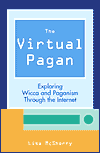
This is one of those books that has a definite audience. While most of the information in it will be familiar to the majority of people reading this review, there are people for whom it is perfect. Those people are the ones who may or may not be new to paganism, but who are relatively new to the Internet.
The general overview of the book is that it’s Wicca 101 + Internet 101 - the pagan internet 101. McSherry explains the basics of both Wicca and getting online with excellent detail–she thinks of pretty much everything. It’s a good beginner’s book just for that material.
However, where this book really shines is in online group dynamics. It’s obvious she has the experience she claims, as her writing is thoroughly backed up by anecdotes. She’s careful to explain how online communication differs from in-person communication, how misunderstandings can arise even easier, and how to deal with a setting that is more easily left than a HPS’ home. She also guides the reader through reasons to (or not to) join up with an online group.
I only have two very minor quibbles. First, she uses Wiccan and pagan interchangeably, and on p. 9 says that all pagans follow the Wiccan Rede. That’s not so–I and many other pagans follow neither the Rede nor any ethical statement like it. The other minor gripe is on p. 45, she says not to follow any group that accepts outlandish things like pop culture entities and the Illumunati as “truth”. As someone who has worked my fair share of pop culture magic (and who is married to Taylor Ellwood, author of the book, “Pop Culture Magick”) I do have to disagree that modern mythology is less effective *in practice* than ancient mythology. If we can use modern ritual tools to work with ancient beings, we can also use modern (and ancient) technology to work with modern mythology.
However, those two points are two very minor disagreements I have, and they do not take away from the quality or purpose of the book. If you know somebody who is just getting online, and they’re pagan (new or not) given them a copy of “The Virtual Pagan”. I really wish I’d had this back in the mid-90’s when I first discovered paganism and the internet about the same time, because it *really* would have made my introduction a lot smoother–and probably helped me to avoid some of my early flame wars!
Edit, 12 February 2007: Lisa emailed me this response to my quibbles ‘n bits (she is a nifty person, by the way :):
“The first one was the result of a young writer getting a tad steam-rolled by a publisher. In retrospect, I didn’t think it through and I let them make an editorial decision I now regret.The second. . . well. . . all I can say is that I HADN’T heard of anyone even vaguely respectable working with pop culture. I certainly wouldn’t say anything like that now. (Although, I still think people who buy into conspiracy theories and secret groups like the Illuminati are more likely in the ’10 foot pole’ category than trustworthy.)
Far be it from me to shit on modern magic!”
So there you have it!
Five pawprints out of five.
~review by Lupa
Author: Lisa McSherry
Weiser Books, 2002
$14.95
